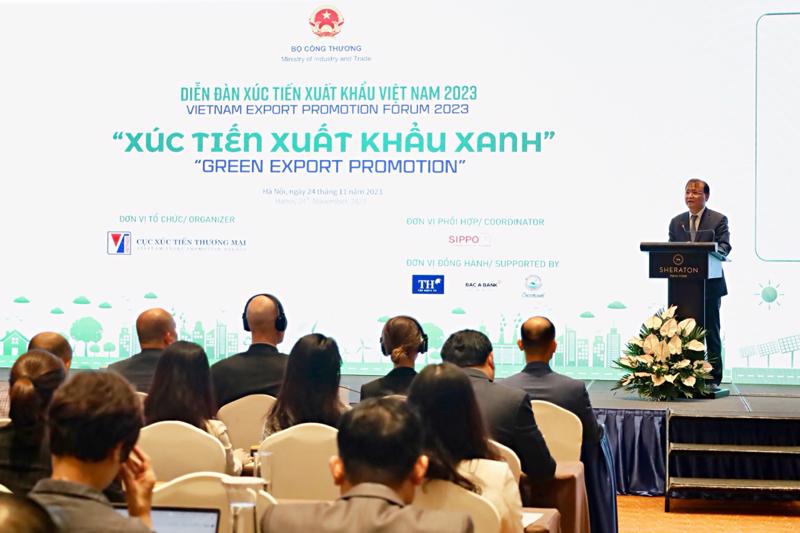“The trend towards green and sustainable development has been and is shaping new ‘rules’ for commerce and investment,” Deputy Minister of Industry and Trade Do Thang Hai said in his address to the Vietnam Export Promotion Forum 2023, organized by the Ministry of Industry and Trade (MoIT) in cooperation with projects supported by the Swiss Government. Attended by over 300 delegates, including leaders from ministries, sectors, localities, embassies, international organizations in Vietnam, associations, and businesses, the Forum took place on November 24 in Hanoi.
Many developed economies worldwide have imposed stricter environmental regulations on imported goods, the Deputy Minister went on, including the EU’s green growth policy, the European Green Deal, and accompanying programs like the Carbon Border Adjustment Mechanism (CBAM), the Farm to Fork strategy, the Circular Economy Action Plan, and the Biodiversity Strategy for 2030. Therefore, to avoid being excluded due to high environmental and social standards set by importing markets, exporting countries need to change their mindset and focus on the “green” nature of the supply chain in international trade to meet the stringent technical requirements of the market.
Experts and speakers at the Forum focused on analyzing practical solutions for green development and green exports and supporting measures for businesses to meet the requirements of importing markets. They delved into regulations in importing countries, carbon adjustment mechanisms, and recommendations for crafting policies to promote green exports.
Discussions also covered solutions for associations and businesses to facilitate the green transition in production and exports. Through this, evaluations, analyses, and plans were formulated to effectively support businesses in trade promotion, aligning with the new context.
Successfully implementing an export strategy, particularly for a country with a developed foreign trade sector like Vietnam, necessitates policies and mechanisms related to exports and imports that are always responsive and adaptable to the characteristics and trends of the global market, ensuring the country stays competitive internationally.
Based on the practical trends of green transformation in international trade, Dr. Nguyen Phuong Nam, UNFCCC Reviewer on GHG inventory reports at the UN, said Vietnamese businesses face direct impacts relating to exports in the context of implementing the CBAM.
He highlighted that with approximately 13.8 per cent of Vietnam’s export turnover being in carbon-intensive goods directed to the European market, the application of the CBAM will substantially affect Vietnam’s exports. To seize opportunities and adapt to stringent requirements for green exports, he recommended diversifying trade partners, conducting risk assessments, preparing scenario planning, and developing a long-term, sustainable carbon reduction strategy for Vietnamese exporters and businesses based on the existing reality.
Mr. Clement Graf, Head of the Swiss Import Promotion Program (SIPPO), emphasized that the green development initiative requires collective efforts from all parties. Specifically, Vietnamese businesses need to understand their roles and responsibilities and coordinate closely with relevant stakeholders. By working together, the shared goal of green and sustainable development can be effectively achieved.
Deputy Minister Hai added that to contribute to the specific implementation of the outlined directions and goals, the MoIT had chosen the theme “Promoting Green Exports” for the annual Forum since 2022. As a result of the 2022 Green Export Promotion Forum, the Ministry of Industry and Trade has been actively directing and supporting businesses in transitioning their growth models towards carbon reduction. Efforts include the research and issuance of policies, mechanisms to support the implementation of clean technology solutions, and the enhancement of energy efficiency for cleaner production and a more circular economy.









 Google translate
Google translate